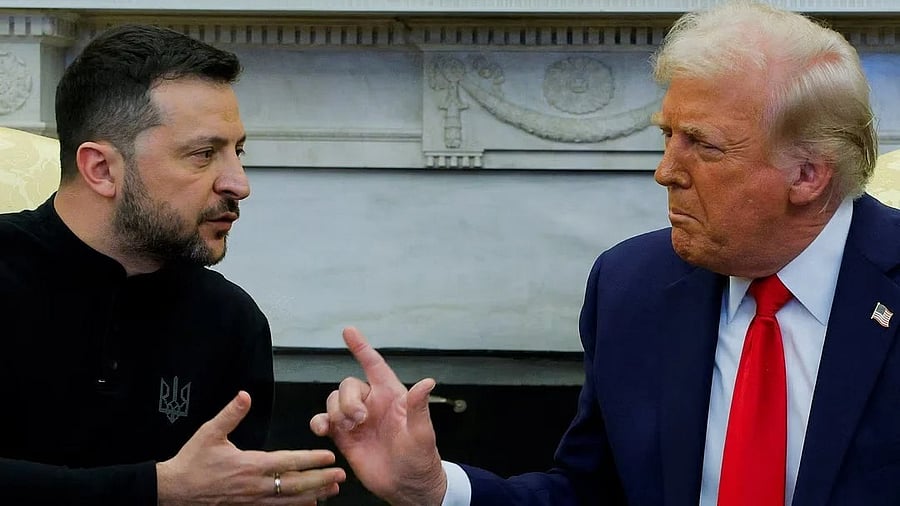
US President Donald Trump and Ukrainian President Volodymyr Zelenskyy.
Credit: Reuters Photo
By Marc Champion
There’s every reason to believe leaked accounts that a shouting match erupted between Donald Trump and Volodymyr Zelenskyy when they met in Washington last week. We’ve seen it before, after all, on camera. The US president appears to be back on board with helping Russia browbeat Ukraine into accepting a deal that would hand Vladimir Putin territory he’s been trying to conquer since 2014.
What’s reportedly on offer wouldn’t achieve peace. It would be yet another attempt by Putin to secure by diplomatic means the strategic breakthrough he’s been unable to win on the battlefield. To accept would mean certain disaster for Kyiv. To refuse risks the same.
Trump, according to a Financial Times report, cursed freely during Friday’s meeting, at one point sweeping aside maps of the frontlines saying he was sick of seeing them. Yet those maps were there for a reason — to explain to the president before he meets Putin one-on-one in Budapest in the coming weeks that this is not, as Trump put it in an interview on Fox News, about how much “property” Russia has taken.
Seen merely as real estate, the proposed geographical sacrifice — while horrifically unjust — may look like an acceptable price to end the war, especially if Putin were to give back other pockets of land in a swap that brought lasting peace. At issue is about 30% of Donetsk province, which adds up to about 8,000 square kilometers, or just over 3,000 square miles, of territory.
First, in the context of this war, that’s a lot of land. According to Harvard University’s Belfer Center, which keeps count, Russia currently occupies about 19% of Ukraine, or 45,109 square miles. Of that total, Moscow has gained 4,484 square miles since it stemmed losses to Ukrainian counteroffensives in November 2022. In other words, Putin is asking to be gifted almost two thirds as much territory as he’s been able to take in three years of fighting, at the cost of hundreds of thousands of dead and wounded troops.
Second, as the maps would show, what’s at stake is the so-called fortified belt, a string of heavily defended urban centers that are the reason Russian forces have had so much difficulty advancing further in Donetsk. They’ve been trying to take these towns since 2014. One of them, Slovyansk, was the very first city Russian-led forces took at the time, only to lose it as Kyiv began to respond. Cede Kramatorsk, Slovyansk, Kostyantynivka and Druzhkivka, and the path further west to the major conurbation of Dnipro and north to Ukraine’s second-largest city Kharkiv would be open.
Even that’s not the worst aspect of this potential deal, which Putin has formulated to be either unacceptable or an instrument of national suicide. If Zelenskyy were to agree, the perceived betrayal of Ukrainians who fought and died to hold these cities and all they protect, while abandoning their populations to brutal occupation, would tear the country apart from within.
If he refuses, however, Zelenskyy will once again, in Trump’s view, become the obstacle to peace. The US president has a great deal of leverage to force the Ukrainian leader’s hand, including access to critical US intelligence and the right to purchase Patriot air defenses and other vital equipment, such as Himars rockets. This is power he’s been willing to exercise. Yet he’s declined to be similarly aggressive with Putin despite making threats over sanctions and long-range Tomahawk weaponry; to believe Trump will stand up to Russia at this point seems an irrational exercise of hope over experience.
Finally, even a ceasefire on current lines, which Zelenskyy says he is ready to accept as a prelude to talks on a wider settlement, would present potentially fatal risks for Ukraine. Russia’s war economy would continue pumping out missiles, drones and weapons, while mobilizing new troops for a future assault. That would become all the more feasible if, as is likely, a Trump deal were to include ending economic sanctions, refueling the Russian economy. Ukraine, by contrast, would have to rely on European aid and will to build up the defenses to deter further invasion. Its own resources would be exhausted by the vast cost of reconstruction.
Europe’s position would be little better. It can’t afford to let Ukraine become a staging post and resource for further Russian destabilization efforts, as Putin tries to secure his place in history by overturning the balance of power on the continent. But if leaders from Berlin to Brussels encourage Zelenskyy to stand firm and Trump then pulls the plug on Ukraine, Europe also cannot replace US intelligence gathering or the critical weapons it continues to sell.
Trump has flip-flopped on Ukraine more than once, but his preference for a bilateral deal with Moscow made at the cost of Kyiv and Europe remains a constant. Seemingly, all it took for Putin to persuade Trump to change tack this time was some flattery and a phone call. Suddenly, from saying Russia was losing the war and threatening to send Tomahawks to Ukraine, he’s back to echoing Kremlin talking points, saying that Kyiv is doomed to destruction if it doesn’t capitulate to Putin’s poison-pill terms.
Whether Trump sees Putin’s goals and a weakened Europe as serving US interests, or whether he’s simply determined to claim a win as peacemaker is hard to say. But the idea that he’s playing hardball with Putin in private, too, as he tries to bang heads together, doesn’t stack up.
Unless the White House can be swayed to pivot once again toward a policy of making it harder – rather than easier - for Putin to continue his expansionist war of choice in Ukraine, the coming Budapest summit could be among the most dangerous moments Ukraine has faced since the early days of invasion.